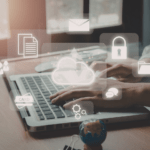Introduction
You might think cybersecurity is all about firewalls, patches, and anti-virus, but often, it begins (and sometimes ends) with a conversation. Small check-ins like, “Did you expect that email?” or a verbal confirmation from a coworker add up to
Security doesn’t just come from technology, in other words. It comes from people talking with each other; sharing when they notice odd things, asking questions, and refusing to assume everything is as it seems.
Why Small Interactions Matter
Remember, attackers rely on trust and assumption. If we assume that every request (especially urgent or financial ones) is valid, we make things easy far too easy for cybercriminals.
Meanwhile, a little hesitation can stop a big mistake. Verifying something as simple as, “Did you really ask for a payment change?” or “Is this message legitimate?” breaks the chain of risk.
Why? Because conversations create accountability. When you speak up, you give others permission to do the same. That makes it much more likely that the team will catch any mistakes.
Case Study: Chemical Manufacturing Loses in BEC Attack
In August 2024, a chemical manufacturing company, Orion S.A., revealed that it lost $60M in a BEC attack. The company, although headquartered in Luxembourg, made the announcement by filing with the Securities and Exchange Commission.
Threat actors tricked a non-executive employee into transferring money to accounts controlled by criminals. They gave fraudulent instructions that appeared legitimate. Because a low-level employee blindly trusted that the communications were real, they executed a massive wire transfer without verifying whether the request was real, and ended up costing the firm millions with just one scam.
One moment’s check potentially could have prevented such a huge financial loss.
Common Scenarios You Might Encounter
What kinds of situations might you find yourself in, where your “hello” or “question” could stop a bigger breach?
- A vendor’s email asking you to enter new banking info.
- A message from “IT” telling you to click a link to resolve a supposed urgent problem.
- Unexpected attachments or PDFs with familiar-looking sender names.
- Someone requesting sensitive info (like login credentials, or financial data) via text or email.
You don’t need to be a cybersecurity expert — just thoughtful, alert, and willing to ask.
How to Shape Conversations That Keep Everyone Safe
So how can you contribute to a culture of security in your workplace? Here are some habits and mindset shifts you might use around the office:
- Question before you click.
If something seems unexpected, stop. Ask via another secure channel: “Did you send this?” or “Is this normal procedure?” - Use known channels.
If you receive a request via email, phone, or chat that seems odd, confirm through another trusted channel. This might be a phone call, or a message on Teams, but do not reply to the potentially suspicious message. - Speak up without shame.
If you spot something odd, report it. It’s better to be cautious and safe than to ignore your gut about something shady. - Share observations.
If you notice a coworker got an odd message or others are receiving strange requests, talk to them. Sometimes your vigilance is the spark someone else needs to remember their security awareness training!
A question, a double-check, or a willingness to pause can be the push you need to reevaluate a tricky situation. Having these conversations around the workplace will make cybersecurity more commonplace there every day.
Conclusion
Security isn’t just “IT’s problem.” It’s everyone’s problem. Protecting your workplace starts with small, everyday conversations. In cybersecurity, a little awareness (and a little conversation) can go further than thousands of dollars of software!
When you say, “Are you sure?” — meaning anything from, “Hey, this seems strange” to, “Do you really need me to do this?” — you’re doing more than just being cautious. You’re building a workplace culture where people protect each other.
The post How Everyday Conversations Shape Cyber Safety appeared first on Cybersafe.




